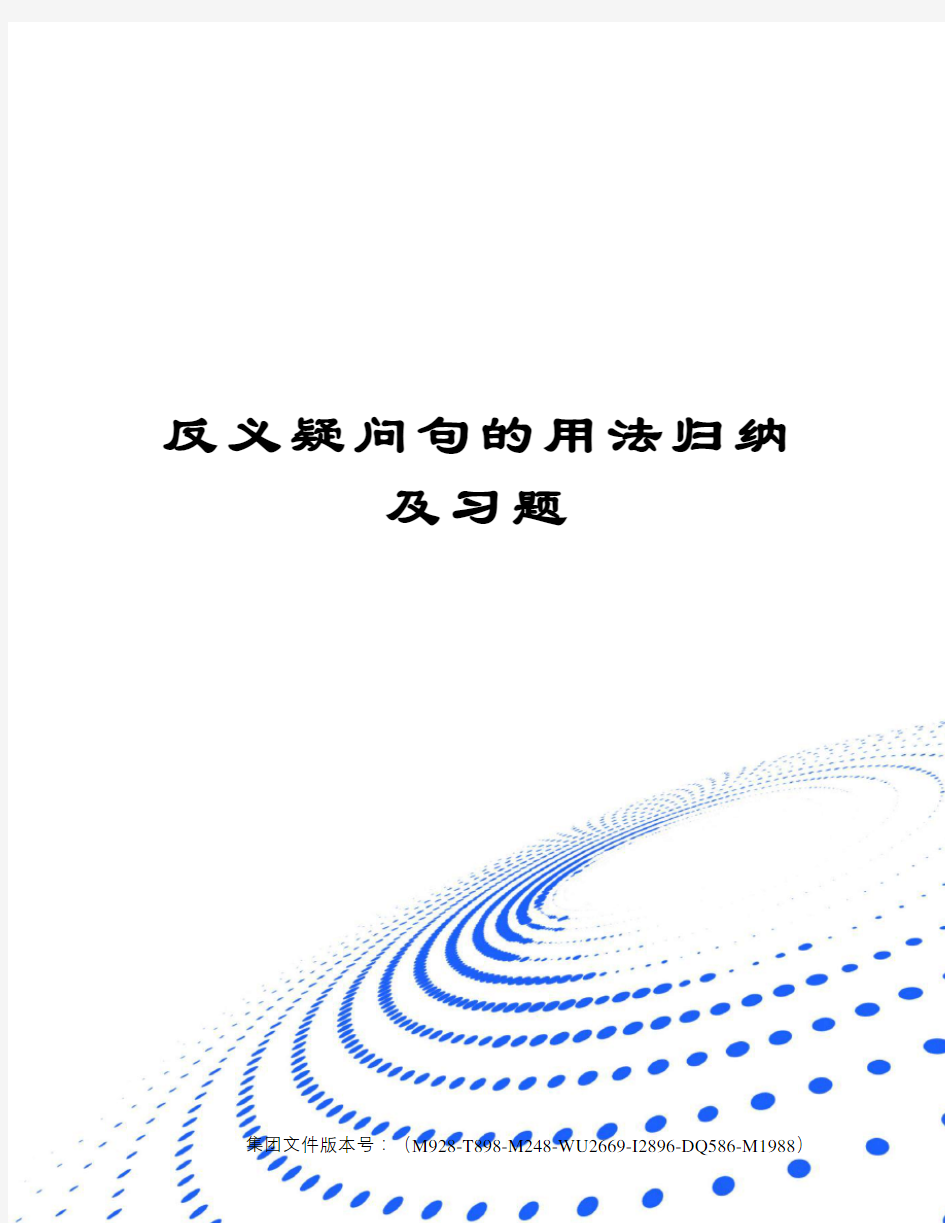
反义疑问句的用法归纳及习题优选稿
- 格式:docx
- 大小:112.76 KB
- 文档页数:10


反义疑问句的用法归纳
及习题
集团文件版本号:(M928-T898-M248-WU2669-I2896-DQ586-M1988)
反意疑问句
【反意疑问句】
(一)概念:反意疑问句是由陈述句和附在其后的附加疑问句组成。其中附加疑
问句是对陈述句所说的事实或观点提出疑问,起证实作用,一般用于证实说话者
所说的事实或观点。
(二)要点注意:
1、反意疑问句前后两部分谓语应是:“肯定陈述+否定疑问”或“否定陈述+肯定疑问”。
2、简略问句如果是否定式:not应与be,do,will等系动词、助动词、情态动词缩写。
3、简略问句的主语不用名词,应用人称代词。
4、陈述部分含“too...to”时,是否定句。
(三)用法:
1) 陈述部分I am时,疑问部分要用 aren't I.
I'm as tall as your sister,aren't I (我和你姐姐一样高,对吗)
2) 陈述部分用 no, nothing, nobody, never, few, little, seldom, rarely,hardly等否定含义的词时,疑问部分用肯定含义。如: The old man made no answer, did he?
Jim is never late for school, is he?
3) 陈述部分有情态动词
have to +v. (had to + v.),疑问部分常用don't +主语(didn't +主语)。
We have to get there at eight tomorrow, don't we?
used to,疑问部分用didn't +主语或 usedn't +主语。
He used to take pictures there, didn't he / usedn't he had better(最好) + v. 疑问句部分用hadn't you?
You'd better read it by yourself, hadn't you?
4) 陈述部分有would rather(宁可、宁愿) +v.,疑问部分多用 wouldn't +主语。
He would rather read it ten times than recite it, wouldn't he?
5 陈述部分有You'd like to +v. 疑问部分用wouldn't +主语。
You'd like to go with me, wouldn't you?
6) 陈述部分主语是指示代词或不定代词everything, that, nothing, this, 疑问部分主语用it。
陈述部分主语是不定代词everybody, anyone, somebody, nobody, no one等,疑问部分常用复数they,有时也用单数he.
Everyone knows the answer, don't they (doesn’t he)
Nobody knows about it, do they (does he)
7) 含有宾语从句的反义疑问句
A.主语是第一人称
I don't think he is bright, is he?
We believe she can do it better, can't she?
B. 如果主语不是第一人称则疑问部分与主句相对应构成反意疑问句
He thought they were wrong, didn't he (不能说weren't they)
当陈述部分带有宾语从句时,疑问部分的主语应与主句的主语保持一致。
He said that he would come to my birthday party, didn’t he 他说他会来参加我的生日聚会,是吗
但当主句是:I think, I believe, I suppose, I except, I imagine等结构时,疑问部分的主语和谓语动词应与宾语从句的主语和谓语保持一致。
I don’t believe he will succeed, will he 我不相信他会成功,是吗
He doesn’t believe he will succeed, does he 他不相信他会成功,是吗
8) 省去主语的祈使句的反意疑问句,
Don't do that again, will you?
Go with me, will you / won't you?
否定祈使句 + will you?
肯定祈使句 + will / won’t you?
Let's 开头的祈使句,后用shall we(或用shan't we)
而Let us 开头的祈使句,后用will you(或won't you) Let's go and listen to the music, shall we(或用shan't we) Let us wait for you in the reading-room, will you (或won't you)
9) 陈述部分是"there be"结构的,疑问部分用there。
There is something wrong with your watch, isn't there?
There will not be any trouble, will there?
11) 如果陈述句部分的谓语含有带否定前缀dis-, un-, im-或否定后缀-less 的词(dislike, discourage,be unfair/ untrue/ unable, etc.),仍按肯定句处理,其反问部分一般用否定式。
It’s unfair, isn’t it 不公平,是吗